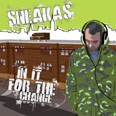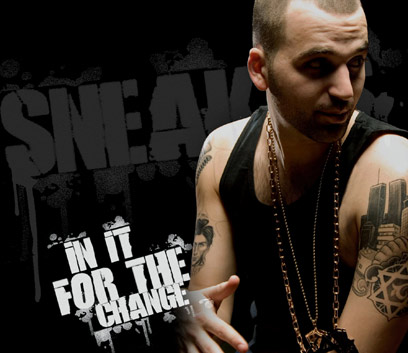
New York City hip hop with a twist of Jewish humor. Sneakas
Art by Adi Binder and Dani Gross
Sneakas redefining Jewish rap scene
Rapper Yoni 'Sneakas' Ben-Yehuda includes content related to Jewish culture in his work. 'A big part of hip hop is Jewish culture if you look at the heritage and the history of it,' he explains
By now, it is a well known fact that Jewish rappers are out there, as the likes of Drake, Mac Miller and Hoodie Allen have all been well documented. But what is still truly a rarity is a Jewish rapper that includes content related to Jewish culture within his or her work, which is what makes Yoni “Sneakas” Ben-Yehuda incredibly unique.
Ben-Yehuda was born in Tel Aviv, Israel, in 1981 and moved to New York City at the age of 11. As a bass guitarist in various bands, Ben-Yehuda was exposed to hip hop at an early age.
One day when his band was supposed to perform in a show, the group’s emcee was unable to make it, forcing Ben-Yehuda and his friend to write and perform rhymes. While he notes that they did a terrible job, things took off from there.
After giving up all of his instruments, Ben-Yehuda began listening to plenty of hip hop and focused on rap. He fell in love with the art form, and practiced by writing and free styling. Continuing to hone his skills, he was eventually recognized for his talents and was signed to a production company called Nu Media ten years ago.
“I had been free styling a lot and gaining some notoriety in New York,” Ben-Yehuda told Shalom Life.
“All these really shady people had come up to me and were trying to find me and I’m like 19, so I’m like ‘cool, cool!’ I was just excited that people wanted to work with me. My mom, who’s been a big part of my career, told me, ‘You can’t work with these guys. You need a much more professional team.’ Through some of her connections, she reached Nu Media. I walked into their office with a demo. I didn’t even have it recorded. I just rapped with a beat, and 15 minutes later they signed me.”
 (
(
Very proud to be Jewish (Art by Dani Gross)
The nickname “Sneakas” came about because Ben-Yehuda was a “sneakerhead” as a teenager.
“I’ve been a huge sneakerhead since I was like 14, about the same time I fell in love with hip hop. It was two things that came together for me. I had a different rap name and my boy at the time was like ‘you should call yourself Sneakas’ and I was like, ‘Wow, that’s awesome.’ It kind of stuck and I’ve been Sneakas ever since and I’ve been collecting sneakers ever since.”
Sneakas credits the likes of Jay-Z, Eminem, Lupe Fiasco, Talib Kweli, Mos Def and Pharoahe Monch as his rap influences. He also enjoys listening to the Red Hot Chilli Peppers, Marvin Gaye, Norah Jones, Iron Maiden and the late Amy Winehouse. While each of these artists is extremely unique and talented, Sneakas says that he never tries to mimic others when creating his own work.
“I think that the worst thing a rapper or somebody in music can do is try to emulate someone else’s art,” he said. “I just try to be open to being influenced musically and then using that to find my own sound. If you really love art, you use it as an inspiration to create your own from it. I never imitate anybody.”
When asked about his own style, Sneaks described it as “New York City hip hop with a twist of Jewish humor and a big chip on my shoulder for anybody who thinks they’re better than me.”
'A rapper first and a Jewish artist second'
He says that when rapping, he likes to be political and often reflects on the conflicts in the Middle East. In 2007, Sneakas began working with Mazzi, an Iranian Muslim rapper. They were joined the following year by MC Serch, a well known, Jewish-American hip hop emcee who helped promote their Peace in the Middle East project. Through his company, Serchlite Multimedia, Sneakas has been working with MC Serch ever since.This past April, Sneakas released his first mixtape, titled “Hebonics 101,” which was presented by Serchlite Multimedia and hosted by Hot 97’s Peter Rosenberg. The mixtape, which can be downloaded for free on www.sneakasny.com, connects Jewish street culture through the veins of hip hop. While it may surprise some people, according to Sneakas, rapping about Jewish content comes fairly easy.
“A big part of hip hop is Jewish culture if you look at the heritage and the history of it,” he said. “Rap and hip hop are about going through struggles and plight and experiences. I think that Jews have gone through a lot and there’s a lot to be told. There’s a lot of tension between Jews and other ethnicities today and it’s very important that people see strong Jewish characters and personalities.”
In his future works, Sneakas does not foresee including so much Jewish content, as he feels that such a specific subject matter tends to alienate those who cannot relate to it.
“I represent my Judaism, I’m very proud to be Jewish and will always throw a punch line or a joke or something like that in the records, but I don’t think that’s the only thing that defines me. I think I’m a rapper first and a Jewish artist second.”
He is currently working on a song for his next mixtape, which will also be free, about how he fell in love with hip hop. Other themes that Sneakas likes to rap about include his family, what he views as the things that are wrong with hip hop and “sometimes just rapping about being awesome.”
Sneakas is also a graduate of the Actors Studio in New York and is actively pursuing that career as well, having performed in some Off-Broadway shows. He says that his two careers go hand in hand due to being very similar to each other.
“MC Serch told me that the best rap records are very cinematic and I think that there’s a lot of truth in that. A good rapper is a story teller and a good actor conveys the story through his character.”
As both an actor and a rapper, Sneakas often gets to perform live, which is an enjoyable feeling for him. In September, he will be promoting his mixtape through shows in the tri-state area, before going on the road.
“Performing for me in both theatre and music is the greatest thrill because you can actually see your work come into fruition and see how it affects people directly,” he says.
“When you’re on stage and it’s just you and you’re connecting with 200 people or 500 people or 10,000 people or five people, it just makes everything you do worthwhile. You just stand there and you’re in front of the world.”
Reprinted with permission from Shalom Life
- Follow Ynetnews on Facebook










